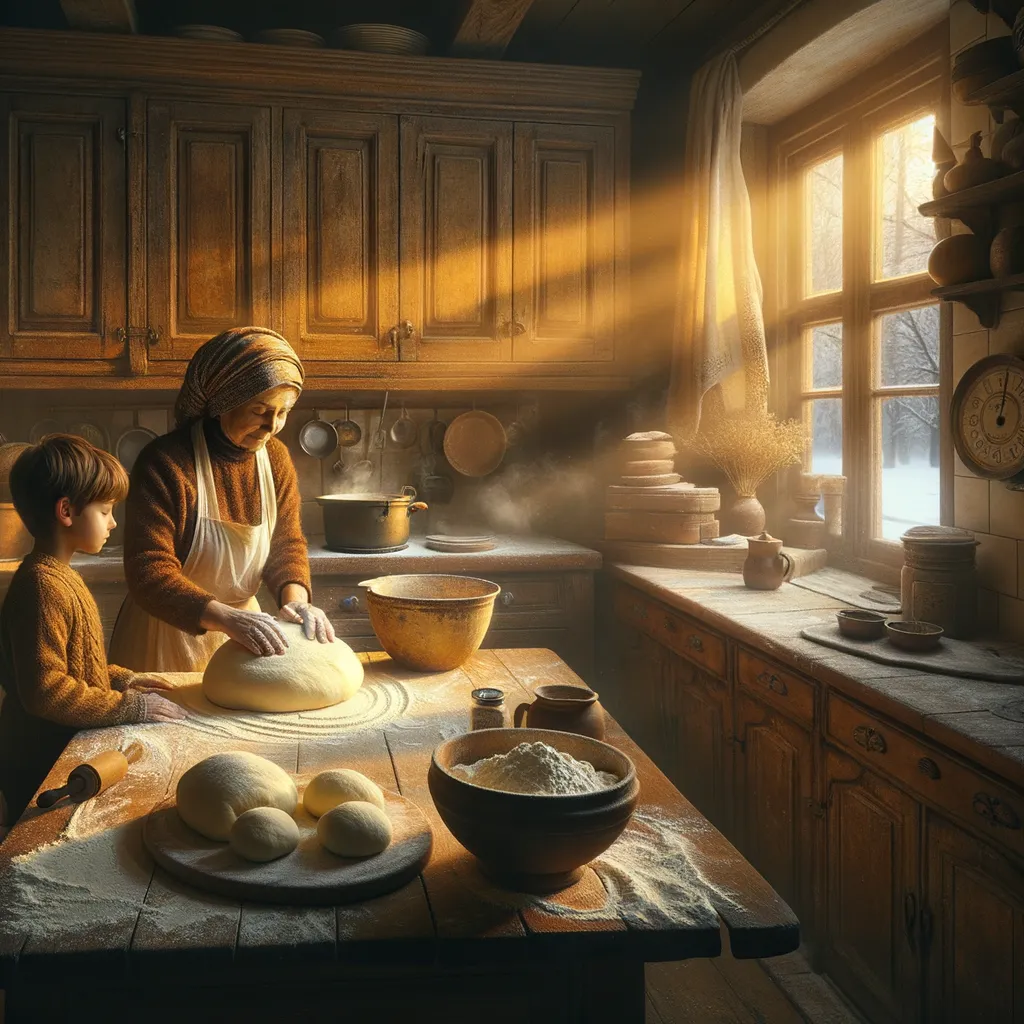Whispers of Bread: A Journey Through Time and Taste
In a sunlit kitchen, enveloped by the comforting scent of freshly baked bread, a young narrator finds themselves captivated by their grandmother’s artful hands as she kneads dough into life. Outside, the world lies still beneath a blanket of snow, but within these warm walls, the rhythm of creation unfolds—a dance echoing the heartbeat of family tradition. As the dough rises, anticipation fills the air, and stories of love and resilience spill forth, weaving a tapestry of connection to ancestors long gone. When the golden loaf finally emerges from the oven, it offers not just nourishment, but a bittersweet reminder of life’s fleeting moments and the lessons held within each bite. Years later, as the narrator attempts to recreate that magic, they discover that while the flavors may evolve, the essence of love and memory continues to shape the recipes of their future.
In the memory of January 9, 2002, I find myself transported back to a small kitchen, the walls a tapestry of warm yellow, where the scent of freshly baked bread enveloped me like a familiar embrace. That day, the world outside was blanketed in a thick layer of snow, muffling the usual sounds of life, but within those four walls, there existed a symphony of scents and sensations that would etch themselves into my memory. My grandmother, the maestro of this culinary orchestra, commanded the space with the grace of a seasoned artist, her hands a blur of flour and dough. The act of making bread was not merely a chore; it was a ritual steeped in love, history, and tradition.
As she kneaded the dough, her hands bore the marks of a life lived fully—wrinkles that told stories of laughter and sorrow, strength and vulnerability. I watched, mesmerized, as she transformed a simple amalgamation of flour, water, and yeast into something extraordinary. The rhythm of her movements mirrored the heartbeat of our family, each fold and push a silent testament to generations of shared meals and cherished moments. This bread was more than sustenance; it was a bridge to our past, a way to connect with ancestors I had never known but felt deeply in my bones.
When the dough finally rose, it took on a life of its own, swelling and stretching as if it were breathing. In that moment, I learned that patience was not just a virtue; it was a necessary ingredient in the recipe of life. We waited together, the warm glow of the oven casting soft shadows around us, and I felt the anticipation build like the rising dough. There was a magic in that stillness, an unspoken understanding that some things take time to become their best selves.
As the bread baked, the kitchen filled with an aroma so intoxicating it could quiet even the loudest of worries. It was a scent that spoke of home, of comfort, and of the fleeting nature of time. I remember how, just as the golden crust began to form, my grandmother shared snippets of her own childhood—stories of her mother’s kitchen, of love, loss, and resilience. The bread became a vessel for these memories, a tangible connection to a lineage that shaped who I was becoming.
When it finally emerged from the oven, the loaf was a masterpiece, its crust crackling and warm, beckoning us closer. I remember the first bite, the crisp exterior yielding to a soft, pillowy center. The taste was an explosion of warmth and nostalgia, each mouthful laced with the essence of family bonds and the love that held them together. It was as if the flavors themselves sang a song, a melody that resonated in my heart and lingered long after the last crumb had vanished.
Yet, as I savored that moment, I was struck by the bittersweet reality that such moments are ephemeral. Life, like bread, is a cycle of rising and falling, of warmth and cooling. Each loaf baked in that kitchen was a reminder that time would always move forward, and that I would eventually have to let go of the past while still holding its lessons close. The bread was not just nourishment; it was a metaphor for resilience, for finding joy in the process of creation, and for embracing the transience of life.
Years later, as I reflect on that day, I realize that the act of breaking bread has become a ritual in my own life. I have sought to recreate those moments, not just in the kitchen but in relationships and experiences that nourish my soul. Each loaf I bake carries whispers of my grandmother’s wisdom, reminding me that the heart of any gathering lies in the shared experience of food and love. The kitchen is still a sacred space, a canvas where I paint my own memories, hoping to pass them down like heirlooms.
However, nostalgia can often wear a deceptive mask, distorting the past into a sepia-toned dream. As I stand in my own kitchen, flour dusting the air, I confront the reality that not all moments can be recreated. The world has changed, and so have I. The bread I bake may not perfectly replicate my grandmother’s, but in my imperfections, I find authenticity. It is in the act of trying, of reaching for those lost connections, that I discover the true essence of what it means to honor the past.
In that reflection, I find a profound realization: the act of creation is as much about the journey as it is about the destination. Each loaf tells a story, not just of ingredients but of love, loss, and the unyielding passage of time. It is a reminder that while we may not be able to hold onto every moment, we can carry their essence forward, infusing our lives with the flavors of those who came before us.
As I close the chapter on that snowy day in January, I am left pondering a question that resonates deeply: how do the flavors of our past shape the recipes of our future?
In the warmth of a kitchen, where dough rises and memories intertwine, the essence of love and legacy transforms simple ingredients into a timeless feast for the soul.



